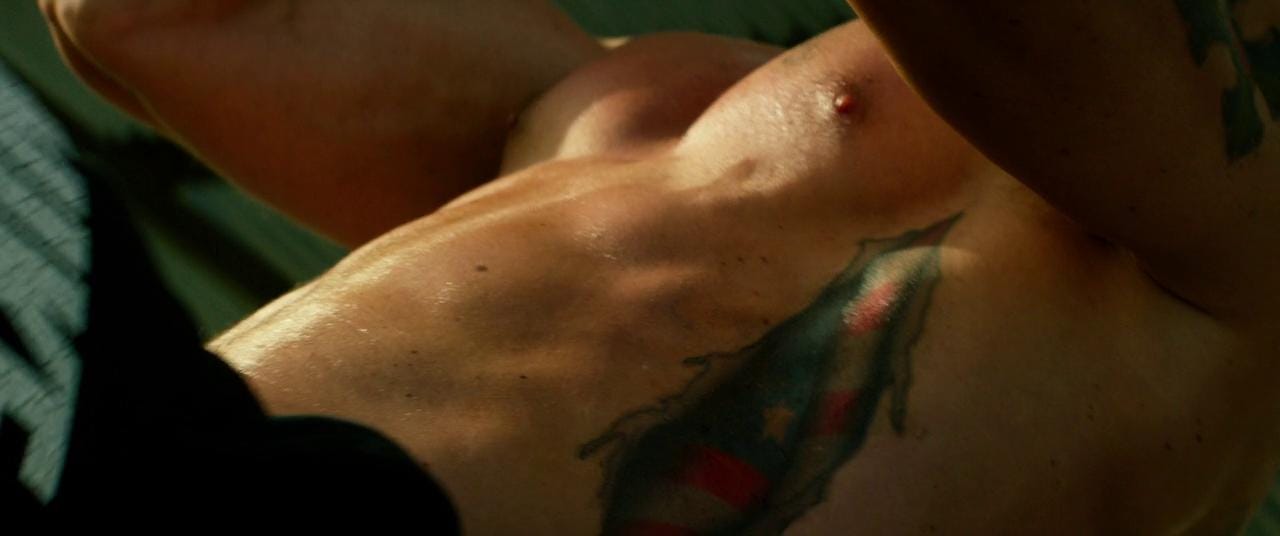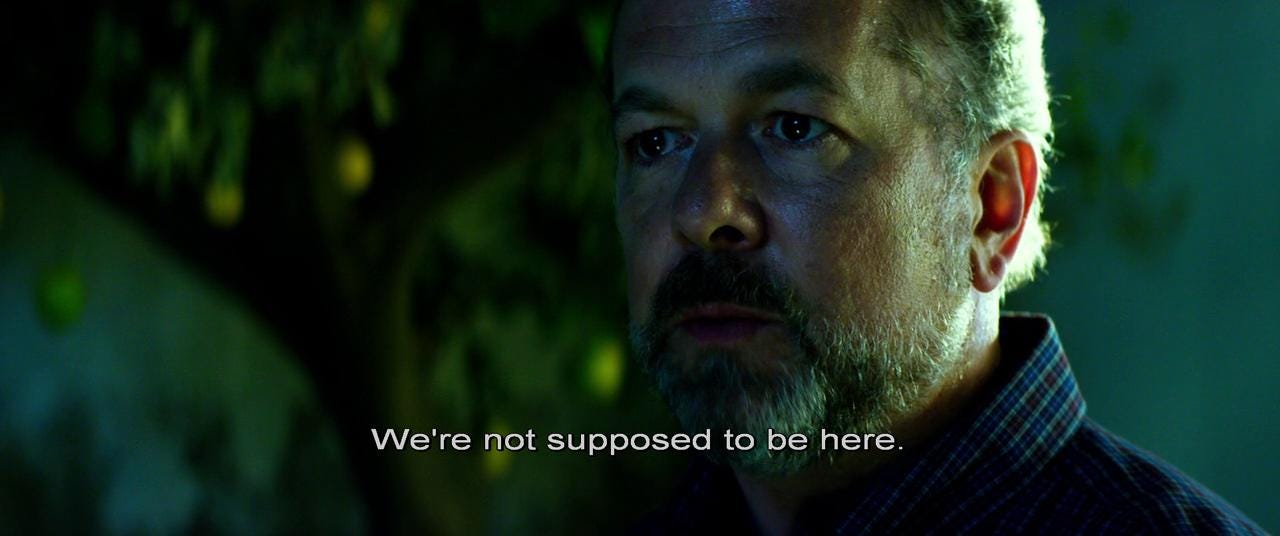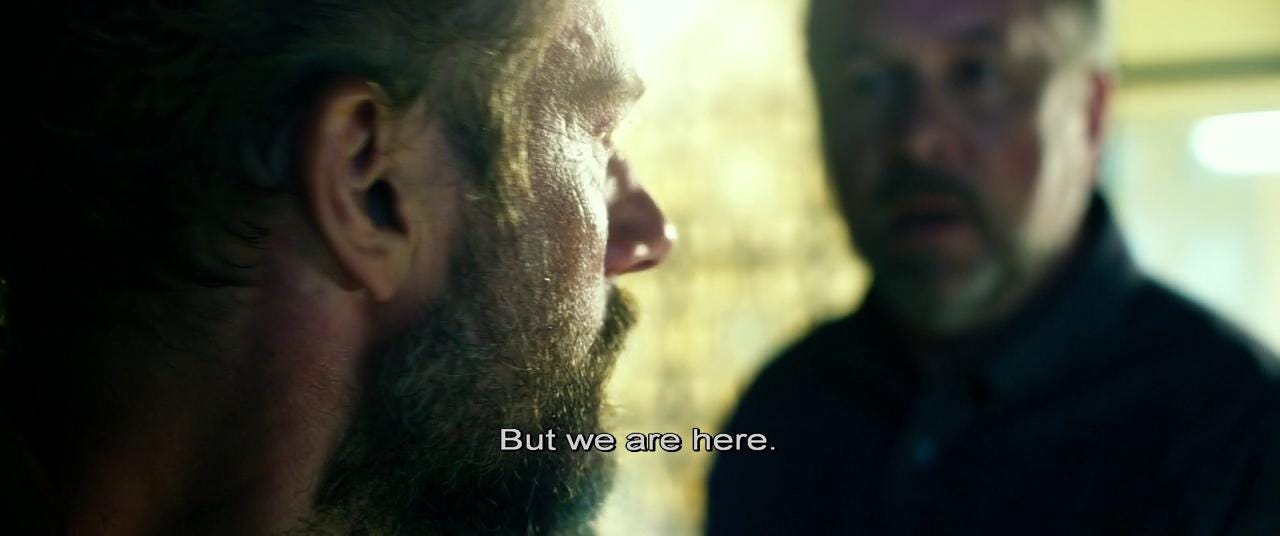Baysian Logic: 13 Hours on the Outskirts of the American Empire
On Michael Bay, Office Jim, and maintaining the posture of control.
This is an essay I wrote for the more casual blog-project which proceeded this substack, le remords, back in early 2020. As such, it predates Ambulance, and, for that matter, 6 Underground. While I have done some revisions for style and clarity purposes, I’ve decided not to try to update the core argument, for the simple reason that I think it’s still fundamentally true, but that to demonstrate that in relation to, in particular, Ambulance (a far more sentimental and humanistic work than anything else Bay has done post-9/11, and thus superficially problematic for some of the harsher judgements I make about him here) would be complicated and time-consuming and disturb the balance of an essay that is, after all, supposed to be about a different film. As such, you’re welcome to read it as if those films do not yet exist, as was the case when it was first published, or to try applying the arguments here to those later texts yourself – neither, I think, will break anything. Anyways…
I think I should state clearly, first and foremost, that I regard Michael Bay as, fundamentally, a fascist filmmaker. That’s the language his movies are written in, and to attempt to obfuscate or minimize that would be doing a disservice them. An attempt at some sort of “left Bayhem” would be as misguided as an attempt at “left Heideggerianism.” But Bay, rather like Heidegger, is a figure that stubbornly refuses to be simply written off. More than that, he’s arguably one of the most important filmmaker of his generation: his films are singular, challenging objects, dense, overwhelming, simultaneously beautiful and hideous, like America itself. Most of all, they're incredibly instructive about the culture which made them possible. You can’t go around, you have to go through. Thus, 13 Hours: The Secret Soldiers of Benghazi, the film in which Bay’s paranoid mythopoetics are most clearly on display. There’s no center to this vision, really, no coherent core idea, but in dealing with a real event, one which Bay obviously genuinely cares about the real participants in (something which was equally clearly not the case in Pain and Gain, which is in many ways this film's sinister twin), many of the layers of abstraction which tend to coat his work (i.e. giant robots) are removed, and the internal cosmology can be seen more clearly.
Within the conservative political imaginary Benghazi occupies a strange double position wherein the US military is simultaneously hero and villain, and 13 Hours necessarily embodies this same dialectic itself. Thus the film chooses as its heroes ex-military security contractors, rather than actual US government soldiers. By centering the narrative on these American mercenaries, assigned to a CIA compound near the doomed embassy, the film solves to its own satisfaction the problem of how to disentangle the heroic Troop-Patriot from the contemptible Obama Administration which it ostensibly must serve. As “secret soldiers” they are set apart, avatars of the American Warrior as transcendental category, a universal constant. That some of them die, are mutilated, aside from producing the ideologically valuable image of the martyr-icon, is a symbol of the wounds Benghazi caused to the Eternal American Empire’s vision of itself.
Boris Groys has described Hitler’s theory of race and art (for him the two are inseparable) as one which casts the Führer as “a trainer, a coach for the German people” who “sought hidden, racially determined forces that had to be discovered and mobilized in the body of the German Volk.” Groys positions as a sort of precursor to many of the “trainer” figures in recent Hollywood films who “try to get their charges to forget everything they have learned, heard, and thought and to trust only the inherent, hidden instincts of their bodies in order to discover the powers to which their bodies are genetically destined.” I bring this up because such a figure is noticeably absent from 13 Hours. Surely one must exist in the pasts of all of these American Warriors, but he’s off-screen, obscured, unknown, like a deadbeat father. We have no window into the process by which America produces its Warriors. It’s simply already happened. This is vital to the fantasy which Bay wants to, has to, create, as it allows him to, in the figure of the invisible trainer, “off-screen” the entirety of the apparatus which produces military contractors and CIA annexes and Wars on Terrors, which strips men of everything which would impede their ability to kill on command. We only see what the imperial machine produces, not the machine itself.
13 Hours is a work of military-industrial myth-making, but is unusual as such in that it is, at its core, about failure. And not valiant failure, heroic defeat in battle, but rather the utter humiliation of the outpost of a great Empire falling to ragtag local militants. But the choice of subject is not as surprising as it seems. In another essay, Groys speaks of “the image of destruction left behind by the iconoclastic gesture” (and the Benghazi attack is certainly an iconoclastic gesture; iconoclasm is fundamental to the aesthetic logic of Islamist terrorism) as something which is “quasi-automatically transformed into the victim’s image of triumph.” This certainly describes something like what 13 Hours does. America didn’t win the Vietnam War, but it did in its movies.
With that said, some attention should be paid to how Bay actually represents the Islamist militants that are his foil. Like in the rest of the film, the underlying logic is fascistic, but this produces results one might not expect. The most instructive comparison might be with Starship Troopers. Verhoeven’s giant, gooey bugs are, of course, a consciously constructed ideal of the fascist Other as that which must simultaneously be infinitely, disgustingly beneath the Volk and an existential threat to its existence. It’s subtextually obvious, of course, that these “bugs” are both no less intelligent than humans and probably didn’t initiate the conflict, but in the fascistic surface text they are an irreducibly hostile and alien foe with whom there is no hope of understanding or conciliation. 13 Hours sees the Islamist militant as no less irreducibly hostile and alien, but beyond this it diverges, as instead of disgust and contempt there is an unmistakable undercurrent of fearful respect for them as an adversary in war who may genuinely be superior. Like any true reactionary, Bay can’t help but admire the jihadist, the most wholly unapologetic imperialist in the world today, as totally devoted to the Caliphate as the SS were to the Reich, as the Dutch East India Company were to the colonial empire. From the moment shit hits the fan, it is clear that the militants are the ones controlling the situation, that they can and will lay siege as long as they have the advantage and will melt away into the darkness the minute they lose it, that they will never be caught, that the Department of Defense will never know who had had a missile locked onto the coordinates of the compound for months, or who actually fired it. The two paranoid refrains which dominate the film are “we shouldn’t be here” and, in any encounter with a non-American, “we don’t know if these are our allies or not.” These are not the words of indomitable Übermensch. Yes, it can be argued that the implicit purpose is to show how poorly the military is functioning under a usurper (read: a black Democrat), but the same process by which the war machine is hidden undermines this. If we are too close to the action to see why it is happening, we are too close to see it happening any other way, as well. In the first few minutes of the film, when two contractors find their truck stopped at a “checkpoint” and surrounded by potential “hostiles,” they get out of it by pulling a gun and telling the men there’s a drone above locked on and ready to massacre them. It works but, of course, it was a bluff – there was no drone, the locals could have slaughtered them easily. The lesson is that America is holding onto its control in the Middle East by maintaining a posture of control. If push comes to shove (as it does in Benghazi), that posture is liable to collapse very quickly (and now, of course, Libya is a “failed state” – take that how you will). Notably, that scenes ends without it ever being clear who was actually holding them up, and what group they were with, if any.
It is not that the film “humanizes” the militants, quite the opposite. Their dehumanization in the form of being rendered as essentially interchangeable servants of God ready to die for their cause, though, is a case for them as Warriors, not against. Even as we watch them get sniped down over and over it is hard not to think that the US is unprepared for this threat. The “Arab mind” is surely as foreign and barbarous to Bay as it is to any other American reactionary, but he isn’t so sure that means we can conquer them. The ending of the film is in a sense an inversion of Starship Troopers: the families of the alien foes, the unambiguous victors of this battle, scour the fields around the ex-compound for their bodies, while the heroic losers, lucky to still be alive, stand around waiting to be evacuated, feeling very afraid.
A brief digression: it’s not insignificant, I think, that the star of this film is John Krasinski. Since getting a foothold with The Office (itself implicitly dependent on the normalization of a far more fascistic social formation than a covert imperial war: the white-collar office), Krasinski has gradually shifted more and more overtly into a position as the avatar of US imperialism in Hollywood, the guy who’s contributing his friendly, recognizable face to the worldwide fight for Freedom and Democracy. 13 Hours wasn’t the start of this transformation, but it is without a doubt what locked it in; he’s Jack Ryan now, the CIA analyst taking down Venezuela’s corrupt dictator, and he couldn’t have done it without Michael Bay.
What’s fascinating to me, though, that it’s Krasinski who has come to serve this function in the culture industry. That roles which once would have gone to a Schwarzenegger or a Stallone now go to Dunder-Mifflin Jim signals that there’s been a major shift in how America chooses to represent itself, one that I think it’s necessary to understand if you want to wrap your head around its whole geopolitical posture now. It’s not that American imperialism is any less brutal or aggressive than it ever has been, but that since the collapse of the USSR it has become beneficial that it appear not hyper-aggressive, but boring. In the absence of an enemy state superpower that’s a real threat to the American Idea, the avatar of the Superman becomes unnecessary, perhaps even counterproductive; better the “contractor,” who’s suitably masculine, noticeably strong, but ultimately not too memorable. Implicitly or explicitly, the idea is a Blackwater merc is just a guy trying to feed his family. He’s capable of heroism, but only because that’s the job he’s been assigned – he himself is a non-entity, not worth paying attention to. No stand-in for Western power has ever been human, per se, but Krasinski’s ascendancy shows that the non-humanity of the Company Man, who can be anything and nothing, has replaced that of the Terminator, who can only be Power and Death.
Okay, digression over. Clearly, despite being a “true story,” this is a film populated by ciphers and phantasies, not people, and as individuals they are more or less interchangeable. The real heart of the film, its real purpose for Bay, if perhaps not his producers, is as an exercise in weapons and technology fetishism. Bay shoots the impact of an RPG like a pornographer shoots a facial, a military command center like a pleasure dungeon full of uniformed bodies caught in an orgy of information. 13 Hours is a film almost entirely devoid of women, but neither is it homoerotic in the way, say, a quintessential Schwarzenegger film like Predator (a full-on queer romance) is. There are plenty of sweaty, muscular male forms, but Bay’s eroticism is entirely the eroticism of the gun barrel and the bullet hole.
In another life Bay may have been one of the great war artists, he “who had the power to witness heroic action and inscribe it into the memory of humankind,” but in an era in which warriors can auto-mythologize with Go-Pros and media blitzes, Bay cannot fill this role, and in 13 Hours we see him try to compensate by reversing the process of the jihadi propagandist: he tries to turn his art into war. But Bay is not really a Warrior, much as he may wish he were. His efforts produce not a more “real” experience but a hyper-artificial one; hard, physical impacts denting the walls of Call of Duty maps. But in an era where the military would like us to believe war is something that happens on the other side of a computer screen, this feels appropriate: the vision of American empire is abstracted, gamified, Farocki’s “war at a distance,” but that the reality of its administration still contains the irreducibly base. Americans still, sometimes, die in wars. Thus, almost despite himself, in this hyper-artificiality Bay (and cinematographer Dion Beebe, whose hard, digital images, no doubt honed in his collaborations with Michael Mann, are invaluable in creating this effect) manages to schematize the encounter between the sublime illusion of empire and the material reality of its administration better than any other contemporary filmmaker.






